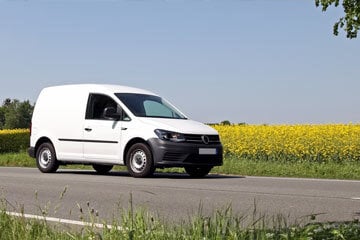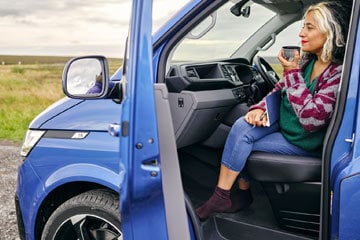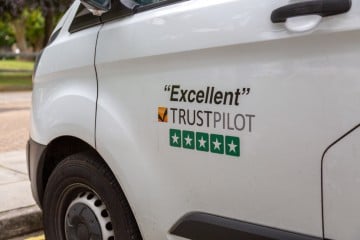Vans are often out on the road all day, they’re bigger and heavier than cars and have more powerful engines, which is why they can be more expensive to insure.
In this guide we'll explore ways to help cut the cut the cost of your van insurance, and longer-term changes you can make to help lower your future costs.

How can I make my van insurance cheaper now?
These tips could help you if you want to find quick ways to lower your van insurance prices.
1. Shop around for the best van insurance deal
Just because your current van insurer gave you the best deal last year, that may not be the case this year.
Do your research and see if it is still the best deal. Chances are it won’t be. Even if your renewal price is more or less the same as last year, it's still worth shopping around.
So compare van insurance quotes to find out who is offering the best deal for you this time.
2. Pay for your policy in one go
While it may be tempting to spread the cost of your van insurance out over a year, this is likely to cost you more than paying for it in one go. This is because a monthly direct debit usually comes with added interest.
So if you can, pay for the insurance upfront to lower your costs.
3. Increase your voluntary excess
Your excess is the amount your insurer deducts from any claim before you get the money.
While a compulsory excess is set by the insurer and can’t be changed, you can vary the amount of the voluntary excess.
So see what difference varying the amount of the voluntary excess does to your quotes when you're comparing van insurance.
Setting a higher voluntary excess may get you lower prices as an insurer would pay out less of the total claim.
But don’t forget that this means you end up paying more if you claim.
4. Off-street parking for your van
If you’ve the option to park somewhere more secure, this could help bring your costs down.
When getting your van insurance quote, see what difference it makes when you change the details of where you leave your van overnight.
5. Leave off optional extras you don’t need
Look closely at what’s included in the policy and what you have to pay extra for.
Make sure you’re not paying for something you’re never likely to use
If your van is never going to leave the UK, for example, then you won’t need cover for driving in Europe.
6. Accurately declare how you use your van
When people think of van drivers they tend to assume that the vans are used for work.
But there are plenty of cases where people use vans for non-business reasons only.
So make sure you tell the insurance company exactly how you use your van.
For example, there's no need to get cover for business use if your van is there to carry around fishing equipment for a hobby.
But if you do use a van for work, make sure you select some kind of business use. For more information, see our guide on the different classes of van insurance.
7. Think about who you add to your policy
Adding more experienced drivers could help lower your insurance costs. But at the same time, less experienced drivers risk putting your prices up.
So think about who really needs to be insured on the van. Do you need to add your mate who has points on their licence or the apprentice who only has a few months' experience?
Their driving records are likely to increase your costs.
8. Be accurate with your mileage
The distance you travel every year in your van can impact how much you pay for your policy.
The more you use your van the more likely you are to make a claim, so the cost of your insurance should reflect this.
You shouldn’t underestimate your mileage to try and get a better price. But overestimating it could mean paying over the odds.
Being accurate with your mileage helps you get the right level of cover at the right price.
You can look at your 2 most recent MOT reports to get an idea of how many miles you tend to drive in a year.
Compare cheap van insurance quotes
Get a quoteWhat can I do to make my van insurance cheaper in the future?
Here are some tips that require a little bit more effort, or are more likely to help you in the long run.
1. Build up a no-claims bonus (NCB)
As with car insurance, you can build up a no-claims bonus on your van insurance.
And the longer you don’t claim, the bigger the NCB should be. This gives you an annual discount on your policy costs.
Some insurers might also allow you to transfer a NCB from a car to a van, but you’re only be able to use it on one vehicle at a time.
2. Advertise your business on the van
Putting your name and business all over the van may make it less attractive to thieves. And so possibly cheaper on the insurance front.
Having some signwriting on your van could also help the police track it down if it’s stolen.
But if it’s covered in a vinyl wrap this may well count as a modification and may mean you need modified van insurance.
Having a wrap on your van is certainly something your insurance company and the DVLA will want to know about.
If you're thinking about adding your business details to your van, check with your insurer to see how it might impact your policy.
3. Drive a van in a lower insurance group
If you're looking to get a new van, consider a smaller, less powerful van in a lower insurance group.
Like cars, vans weighing up to 3.5 tonnes are put into insurance groups, The higher the group number the higher your costs are likely to be.
Vans are put into insurance groups labelled 21-50, with group 21 being the lowest.
Thatcham, the research arm of the Association of British Insurers, looks at how expensive it would be to put a van back on the road after a crash.
Factors considered include:
- The price of the van – expensive vans cost the insurer more if they’re written off
- Van performance and engine size – quicker vans with bigger engines tend to be in higher groups
- Cost of parts – cheaper parts normally means a lower group
- How easy the van is to repair – if it needs to be worked on for longer, this tends to cost more
- Security – if the standard security features on a van are good it’s less likely to be stolen
So it follows that cheaper, smaller-engine vans with good safety features are going to feature in the lower insurance groups. And these vans tend to be cheaper to insure.
For more information, read our guide on van insurance groups.







